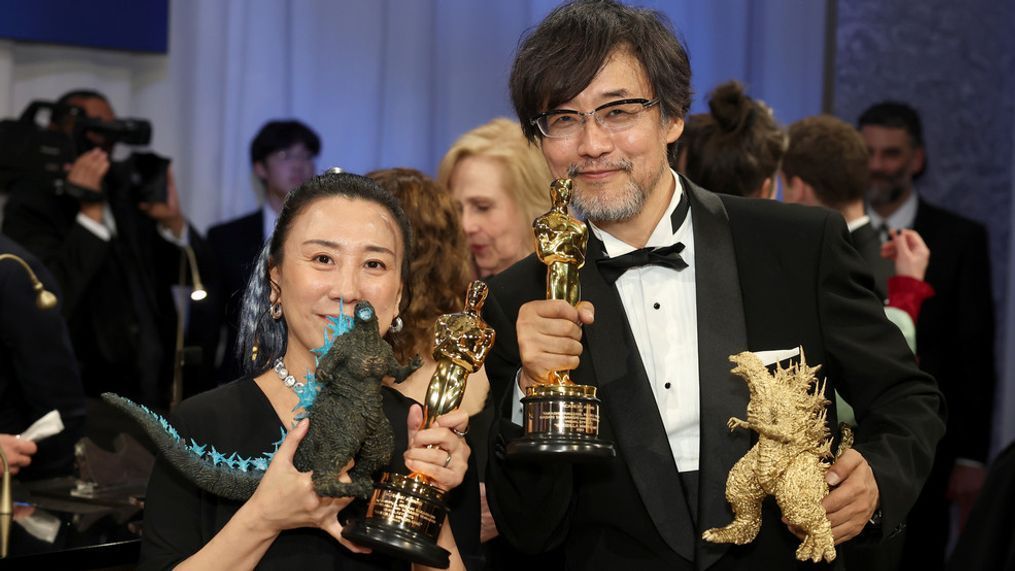'Godzilla Minus One' becomes first Academy Award-winning film in 70-year franchise
LOS ANGELES (TND) — As the "Godzilla" franchise marks its 70th anniversary this year, the franchise centered around the titular "King of the Monsters" was crowned with an award that had long-eluded it: an Academy Award.
It was a monumental moment for the series about a titanic, radioactive lizard and for Japan, as the nomination of "Godzilla Minus One" for "Best Visual Effects" marked the first nomination and win for a Japanese-language film in the category. But the win also showed how far the filmmaking process for these epic monster movies has come in 70 years.
For the first 50 years of the franchise, the titular character was portrayed by an actor wearing a large, rubber suit, and the films for the first couple of decades featured increasingly cartoonish antics as monster-suited actors ran around perspective scaled-down sets of Tokyo and other Japanese cities.
Now, the effects are so cutting-edge that "Minus One," which returns to the setting of the original, 1954 film of post-World War II Japan, was dubbed by the Academy of Motion Picture Arts and Sciences as the leader in the field. The film also received its fair share of trophies back home, winning several Japanese Academy Film Prizes (also known as "Japanese Academy Awards") for "Picture of the Year," "Screenplay of the Year," "Outstanding Performance by an Actress in a Supporting Role," and best cinematography, lighting direction, art direction sound recording and film editing.
Director, screenwriter and visual effects supervisorTakashi Yamazaki also became the first director since Stanley Kubrick (for "2001: A Space Odyssey") to be nominated in the "Best Visual Effects" category -- that win was also Kubrick's sole Academy Award out of 13 nominations.
My career began 40 years ago after the shock of seeing 'Star Wars' and 'Close Encounters of the Third Kind.' To someone so far from Hollywood, even the possibility of standing on this stage seemed out of reach,"Yamazaki said in his acceptance speech.
"The moment we were nominated we felt like Rocky Balboa, welcomed into the ring as equals by our biggest rivals, which was already a miracle. But here we stand,"he added. joined by the other members of the visual effects team (all holding Godzilla figurines).
Yamazaki was embraced backstage by the night's big winner, "Oppenheimer" director Christopher Nolan, after members of the entertainment media asked the Japanese director about the links some fan highlighted between their films. The fact that these two films, one about the conception and deployment of the first atomic bomb and the other a monstrous metaphor for its monstrous impact, came out at the same time was not lost on those who follow the "Godzilla" franchise closely.
In discussing the background of his film, Nolan told The New York Times he considers J. Robert Oppenheimer the "most important person who has ever lived."
His story is central to the way in which we live now and the way we are going to live forever. It absolutely changed the world in a way that no one else has changed the world," he explained to the paper in July of last year. "You talk about the advent of the printing press or something. He gave the world the power to destroy itself. No one has done that before.
Yamazaki appeared to pick up on that thread in Nolan's thinking when speaking to the press Sunday night, alluding to the widespread geo-political instability across the globe as proof of the relevance of these films now.
Of course, the relationship or the juxtaposition was not intentional,” Yamazaki said of the two movies.. “As we were making the film, the state of the world and the geopolitical scene has changed quite a bit. It almost feels fated that both of these films were released in the same year.
Some fans online cheekily highlighted the juxtaposition, as Rob DenBleyker, co-creator of the popular webcomic "Cyanide and Happiness" wrote in a post on X, formerly Twitter, "is Oppenheimer/Godzilla Minus One the first time a movie and its sequel both won Oscars in the same year?" That message was even further honed in the visual effects of the "Godzilla" film itself, as the impact of lizard king's signature atomic breath was designed to resemble a nuclear explosion.
Yamazaki has alluded to making a potential sequel to "Godzilla Minus One" focused solely on the aftermath and the victims, or some film in that vein that could be a spiritual successor to "Oppenheimer" that considers Nolan's words on the consequences of an atomically weaponized world.
“As a person of Japanese ancestry and descent, my response to Oppenheimer [is that] I would like to dedicate a different film to that when that day comes," he said, suggesting his film would be about the perspective of those who suffered the first and only atomic bombings in human history thus far.




